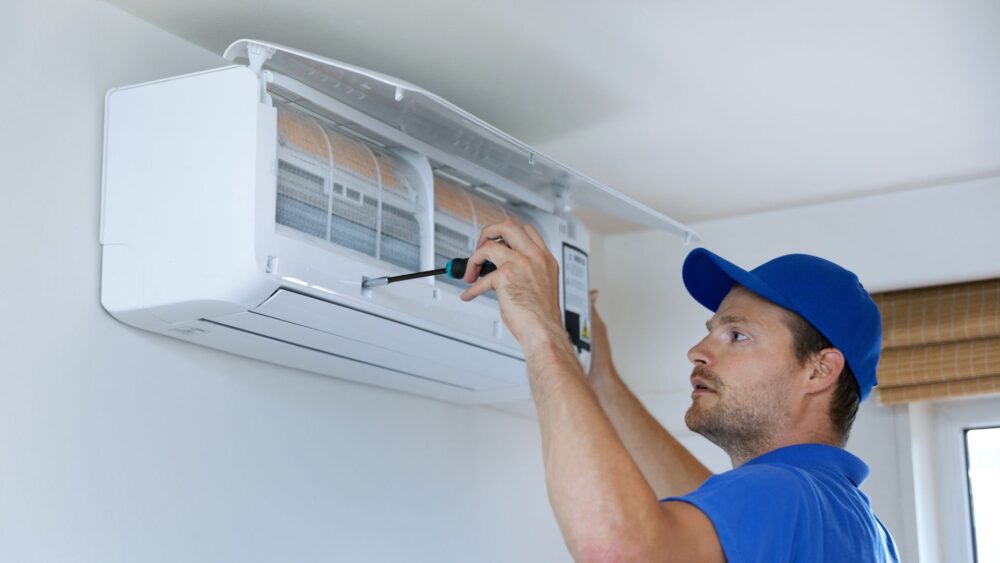When it comes to keeping our homes comfortable, no system works harder than the humble HVAC. With an average ROI of 3800% reported on email marketing investments, one can’t help but draw parallels to the importance of regular HVAC maintenance in ensuring a smooth-running system that doesn’t guzzle more energy than necessary. Just as targeted emails need fine-tuning to avoid spam folders, your heating and cooling units require timely attention to prevent breakdowns and inefficiencies.
Yet many homeowners find themselves at a crossroads – knowing the value of maintaining their systems but unsure where to start or how often services are needed. So, we’re diving into some simple yet powerful tricks to keep your place cozy all year round without emptying your wallet or having a handyman on speed dial.
Essential HVAC Maintenance Tips to Keep Your Home Comfortable Year-Round
If you’re looking for ways to control your finances, look no further than your heating and cooling system. Home heating and air conditioning systems claim more than half of total household energy consumption, and cost thousands of dollars to replace.
Keeping your HVAC system in top condition is a great way to save money on monthly energy bills, and to stave off the high costs of repairing or replacing the system, or having to call your HVAC company.
Read on for HVAC maintenance tips to help keep your home more comfortable and your budget in the black.
Change the Air Filter Regularly
One of the simplest and most effective HVAC maintenance tasks is regularly changing your air filter. A dirty filter restricts airflow and makes your system work harder, leading to reduced efficiency and potentially costly repairs.
Aim to check your filter monthly and change it at least every three months, or more often if you have pets or allergies.
Schedule Professional HVAC Preventative Maintenance
While there are several DIY HVAC maintenance tasks you can do, it’s still important to schedule professional preventative maintenance at least once a year. A trained technician will clean, inspect, and tune up your system to keep it running efficiently.
According to market research, preventative maintenance is a key driver in the HVAC services industry, thanks to its potential for substantial savings on utility bills.
Perform Visual Inspections of Your HVAC System
In between professional service visits, visually inspect your HVAC system yourself. Make sure to give everything a good look-over for any signs of wear, leaks, or damage. Make sure the outdoor unit is level and free of debris.
Inside, keep vents and registers clean and unobstructed. Ensure your thermostat is working properly. Catching small issues early can prevent bigger, more expensive problems down the line.
Keep the Outdoor Unit Clean and Clear
Your outdoor HVAC unit needs adequate airflow to function properly. Keep it clear of grass clippings, leaves, and other debris. Trim back plants at least two feet in all directions.
Consider installing a protective cover in the fall to keep out snow and ice, but be sure to remove it before starting the system back up in spring.
1. Change or Clean Your Air Filters Regularly
Dirty filters restrict airflow and make your HVAC system work harder than necessary, leading to reduced efficiency, higher energy bills, and potentially costly repairs. Check your filters monthly and change them at least every 90 days, or more often if you have pets or allergies.
A simple way to remember is to change them at the start of each season. Keeping your filters clean is one of the easiest and most important things you can do to maintain your HVAC system.
2. Keep Your Vents and Registers Clean
In addition to changing your air filters, it’s important to keep your vents and registers clean. Dust, pet hair, and other debris can accumulate on the grilles and inside the ducts, restricting airflow and reducing indoor air quality.
Vacuum your vents and registers regularly, and consider having your ducts professionally cleaned every few years. This is especially important if you’ve recently renovated, as construction dust can linger in your ductwork.
3. Clean Debris and Dust from Your Outdoor Units
Your outdoor HVAC unit needs adequate airflow to function properly, so it’s important to keep it clean and clear of debris. Trim back plants at least two feet in all directions, and remove any grass clippings, leaves, or other debris that may have accumulated.
You can also gently clean the condenser coils with a garden hose (be sure to shut off power to the unit first). Keeping your outdoor unit clean will help it run more efficiently and extend its lifespan.
4. Seal Your Home from Incoming Drafts
Drafty windows and doors make your HVAC system work harder to maintain a comfortable temperature. Seal any gaps or cracks with weatherstripping or caulk to keep conditioned air inside and outside air out.
Don’t forget about less obvious sources of drafts, like outlets, light fixtures, and attic access points. A well-sealed home is more energy-efficient and puts less strain on your heating and cooling system.
5. Use a Programmable Thermostat
A programmable thermostat allows you to automatically adjust the temperature based on your schedule, so you’re not heating or cooling an empty house. Set it to a more energy-saving temperature while you’re away or asleep, and have it return to your preferred temperature shortly before you return home or wake up.
According to the Department of Energy, properly using a programmable thermostat can save you about 10% a year on heating and cooling costs.
6. Monitor HVAC System Performance and Energy Bills
Pay attention to your HVAC system’s performance and your energy bills. If you notice your system running more frequently or for longer periods, or if your bills are unexpectedly high, it could be a sign that something is wrong.
Catching issues early can often prevent more serious and expensive problems down the road. Staying on top of regular maintenance means your system won’t just run smoother and more efficiently—it’ll also save you a chunk of change over time.
7. Consider Total Replacement or System Upgrades
Even with diligent maintenance, HVAC systems don’t last forever. If your system is more than 10-15 years old, it may be time to consider a replacement. Newer systems are much more energy-efficient, which can mean significant savings on your utility bills.
If a full replacement isn’t in the budget, consider smaller upgrades like a smart thermostat or zoning system. These can improve your system’s efficiency and your home’s comfort without the cost of a complete overhaul.
Importance of Regular HVAC Maintenance
Regular HVAC maintenance is essential for keeping your home comfortable and your energy bills under control. Neglecting your heating and cooling system can lead to decreased efficiency, higher utility costs, and potentially expensive repairs.
According to a recent survey, only 30% of homeowners schedule preventative maintenance for their HVAC systems. But those who do reap the benefits of improved efficiency, lower energy bills, and a longer-lasting system.
Lower Utility Bills
A well-maintained HVAC system runs more efficiently, using less energy to heat and cool your home. This translates to lower utility bills each month, which can add up to significant savings over time.
Staying on top of simple upkeep tasks, like swapping out air filters and giving coils a good clean, ensures your system operates at its best without straining itself.
Prolong the Life of Your HVAC System
The average lifespan of an HVAC system is 15-20 years, but this can vary significantly depending on usage and maintenance. Regular tune-ups and prompt repairs can help extend the life of your system, delaying the need for a costly replacement.
Think of HVAC maintenance like car maintenance – regular oil changes and tire rotations keep your car running longer and more reliably. This rule doesn’t skip a beat when it comes to your heating and cooling system either.
Improve Efficiency
An HVAC system that is properly maintained will operate at peak efficiency, providing optimal heating and cooling with minimal energy waste. This not only saves you money but also reduces your carbon footprint.
Efficient systems also tend to be more effective at maintaining consistent temperatures and humidity levels, improving your overall comfort.
Reduce Risk of Emergency Repairs
No one wants their air conditioner to break down in the middle of a heatwave, or their furnace to fail on the coldest night of the year. Regular maintenance can identify and address potential issues before they turn into full-blown emergencies.
While maintenance doesn’t eliminate the possibility of repairs, it significantly reduces the risk and can save you from the stress and expense of unexpected breakdowns.
FAQs in Relation to Hvac Maintenance
What maintenance should be done on HVAC?
Swap out filters, clear debris from outdoor units, and check for leaks. Regularly schedule professional tune-ups.
What are the 4 types of maintenance for HVAC?
Predictive testing, preventive care, corrective repairs, and emergency response cover the HVAC maintenance spectrum.
What is HVAC preventive maintenance?
This involves routine checks to prevent breakdowns. It includes cleaning components and verifying system operations.
What does HVAC stand for?
HVAC stands for Heating, Ventilation, and Air Conditioning. It’s your home’s climate control system.
Conclusion
The journey through understanding and implementing basic HVAC maintenance practices isn’t just about avoiding summer sweats or winter chills; it’s fundamentally about embracing smart living where efficiency meets cost-saving with open arms. We’ve looked at why changing filters is not just good practice but essential, why clean outdoor units keep your wallet happy during peak seasons, and even how sealing drafts plays into this symphony of indoor climate control.
This isn’t rocket science nor is it deep sea exploration—it’s taking back control over your home environment while pinching pennies along the way.
If there’s anything we’ve learned together, it’s that sometimes freedom means rolling up sleeves for those minor tweaks around our nest—because when AI quietly supports our lives making fraud detection seamless or chores manageable, small acts like seasonal HVAC check-ups ensure we continue thriving comfortably in spaces designed for well-being.
Remember—the right steps toward proactive care today can turn every season under your roof into reasons for joy rather than discomfort.




